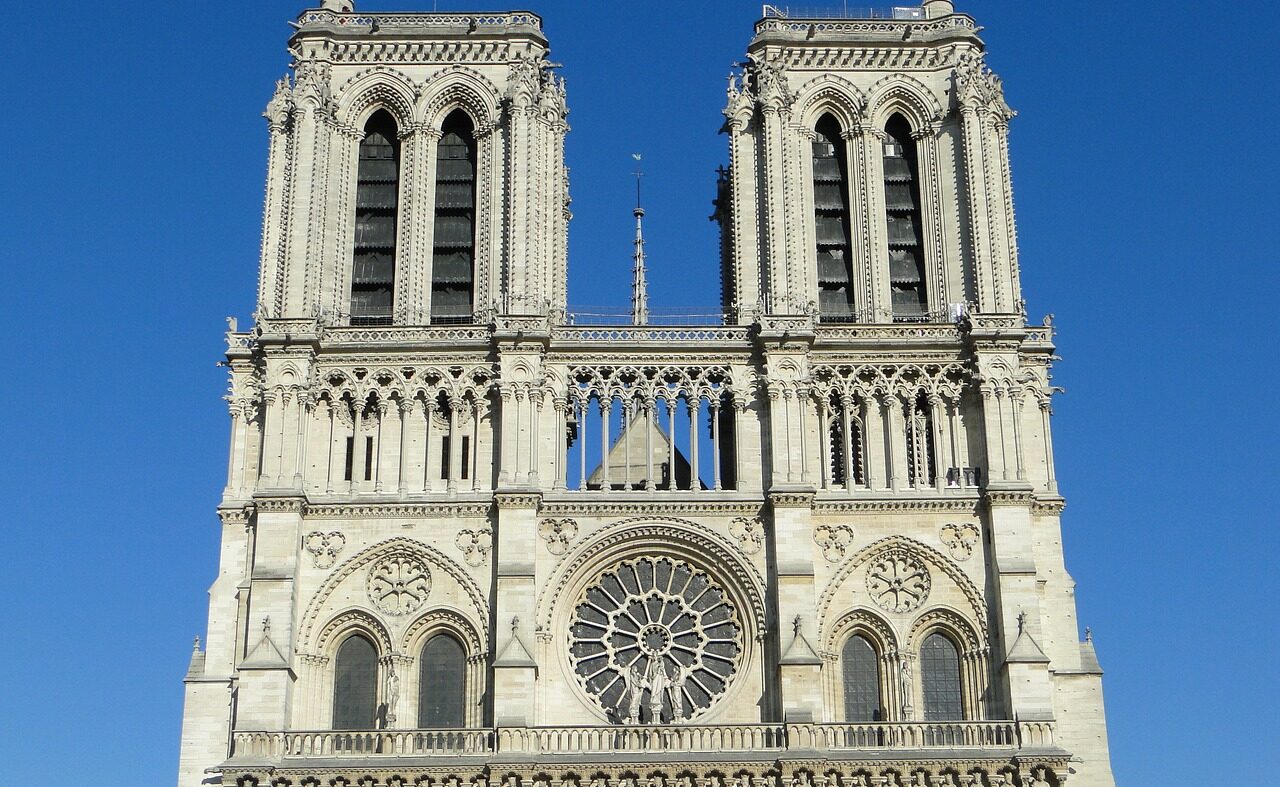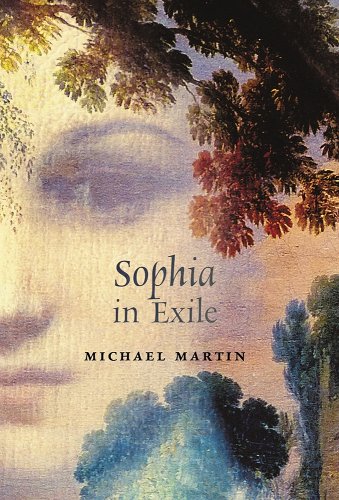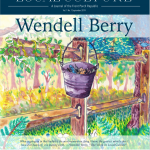Pittsburgh, PA. The 2020s have presented to the public more evidence of a deep psychic split in the Modern World. As 20 years have passed since the millennial change-over, the profundity of the ongoing revolutions in societal relations and ways of knowing have gone from dim background awareness to an unavoidable spiritual crisis.
This crisis did not begin in 2020, nor in 2000, nor in 1945, nor in the 14th century. The beast slouching towards Bethlehem was spoken of in hushed tones as far back as St. Paul, and the epistemological battle stretches into the mistiest reaches of myth, including the Garden.
Year Zero has held a perennial charm for certain minds, and the dawn of the millennium was as happy a time for the neoliberal materialist consensus as the Edwardian summer was to European jingoism. The world was poised to be brought together under the banner of free trade, religious dogma was ever-more-rapidly succumbing to the miracles of scientific triumph, and millions were being saved from the dreariness of “one dollar a day” subsistence economies to city living. All that was needed was to change “anno Domini” to “Common Era” and Utopia could march forward a thousand years.
Even before the jet planes incinerated the Twin Towers to usher in two decades of war, broken hopes, mad dreams, and a permanent surveillance state, one man was looking out from his farm and thought the wind boded ill indeed. His name was Wendell Berry, and in the year 2000 from his Kentucky home he issued a book entitled Life Is A Miracle. It was a response to Edward O. Wilson’s Consilience, a notable articulation of the reductionist worldview which had come to dominate every significant institution in American life.
Life Is A Miracle was a wise and wistful reminder that man does not know by petri dishes alone. The elevation of in vitro over in vivo had led to a mindset which saw all of existence as mere molecules to be interchanged at will in the laboratory. The living whole had vanished like a ghost. This flattening of meaning was, in the eyes of Berry and those he spoke for, laying waste to all that made life worth living. In the pursuit of economic gain, community life had been demolished, and agricultural life shifted to a synthetic model which externalized horrific costs for short-term private gain.
In his book Berry noted a key way the great flattening advanced was through its monopoly of stories, and he advocated a return to figures such as Dante and Shakespeare. But he also wrote: “The world does not exist merely to be written about, any more than it exists merely to be studied.”
The world was not to be flattened to text, it was not a spa or resort for the wealthy, farms were not just one cog in the supply chain, nature had meaning beyond its potential for Instagram backdrops. Implicit in his work was the idea that matter itself has meaning, that the world itself supersedes our attempts to bottle it up and sell it.
This is not the story modernity has told us. Our story, crystallizing with each conquest until it is nearly diamond-hard, goes that our world is the chance product of ever-tinier bits of code. These nucleic acids may be manipulated ad infinitum to create more comfortable surroundings. The binary computer system of 1s and 0s is more orderly than our messy analog reality, and we should attempt to conform the analog to the digital.
The 20 years since Life Is A Miracle have not seen the story of technocratic dominion weaken. Indeed, it has gained power every day over these past 20 years. What we once did to soil we now propose to do to our own bodies. Things which were unthinkable in the summerland of the late 20th century are commonplace. We most certainly will take a thing apart, not even to find out what it is, but because we are certain whatever we replace it with will be Better.
The following 20 years would see Berry’s work heralded in small circles, particularly in the “crunchy conservative” movement. But the dominance of the overall story of our times, that the world was to be cut apart in the lab and sold back to us, gained ever more power, so much so that many no longer recognize that it too is a story, and hence they find it impossible to fathom alternative stories.
Fifteen years later another farmer sent a book out into the world about the terrible psychic trauma that was warping our relationship to reality. This time it came from Michigan and the farmer’s name was Michael Martin. The book was The Submerged Reality, and it would be the first of an unintended trilogy.
Michael Martin spoke of a Sophianic epistemology, a particular and embodied perception of Wisdom, one not a mere wistful, subjective re-enchantment but more real than ourselves. And he spoke about the men and women who passed that way of knowing along like a lantern. The book was a history of these steady waves of mystics, full of footnotes, a book for scholars as well as laymen.
Three years passed and another book was issued from the Stella Matutina farm entitled Transfiguration: Notes Toward a Radical Catholic Reimagination of Everything. Gone were the footnotes, replaced by a swift and clear evaluation of the physical and spiritual landscapes with suggestions for how to move away from a society (and cultural Christanity) that were increasingly walling themselves off from reality behind the edifice of scientific materialism.
In April of 2019 Notre Dame was set aflame.
The fire is where Sophia in Exile, the final book, begins. At the time of the writing of this review the consequences of that fire emerged from the wreckage: “France’s National Heritage and Architecture Commission approved proposals by the diocese of Paris to bring a more modern look to Notre-Dame before its planned reopening in 2024, including the installation of contemporary artworks and new lighting effects. Opponents say the changes will debase the 850-year-old cathedral and disturb the harmony of its Gothic design.”
To the modern mind the sentiment of the opponents is a joke: the Gothic design was the barbarism; it is we who will lift up the Cathedral to our own level. This is the story of Promethean Man. It is the story of the Americas, of nominalism, of brutalism, of Manifest Destiny and colonialism and synthetic farming and CFOs and chemical poisonings. It is a story driven by haunted memories of plague and sin without hope of transcendent redemption: Man is born into misery but through the genius of a few we can displace the horror of our circumstances and bring the world under our control. The frontier may be lost but the laboratory takes its place.
Sophia In Exile responds to this de-sacralizing impulse with a counter story. Crunchy conservatism birthed thousands of internet distributists, but as ecologist and author Paul Kingsnorth has noted repeatedly over the past decade, what we need is a different story to reveal the coherence testified to by these scattered discontents.
Sophia, Wisdom Herself, is the story. It is also the story of the Rosary and the prophet Nikolai Berdyaev, hymn-writer Eleanor Farjeon, the troubadour poets, the Green Man, Parzival and the Holy Grail. It is the story of a world Created and made for Redemption, not augmentation. The story of Sophia is not a history like Submerged or a reimagining like Transfiguration. We walk among the ashes of Notre Dame and a starved topsoil. These stories are not a manifesto but, rather, cracks in the concrete to haunt our minds with the possibility that our culture’s story of dead and conquered nature is a false and damaging myth.
Wisdom has lost her face and thus her story. Downgraded to mere rules (or, worse still, metaphors), Creation and Wisdom become dead abstractions. Our stories have lost their supernatural charge. Our epistemology curtailed, we no longer commune to adore but grasp to control. There is nothing to know except “how,” and even when the remnants of Christian culture acknowledge the “how” cannot give meaning and all too often enables brute force, these remnants tend merely to exhort us to act “as if” there were a moral, beautiful pearl in Nature. The Reality of the transcendent is cause for embarrassment.
As he discusses Sophia and the Green Man, Martin emphasizes they are not metaphors, nor chicken soup for the soul: “I am often puzzled by theologians and other Christian intellectuals and academics who resolutely affirm the Real Presence in the Eucharist, the efficacy of prayer, and the existence of God, but who get a little fuzzy in their assurance when it comes to angels and demons, not to mention the qualities of relics and holy water. And don’t even mention fairies or green men. If the numinous exists, it cannot be only in the context of the Mass. Unfortunately, most of us are only porous (or pretend to be) on Sundays.”
Submerged Reality discussed the Scholastic (thus highly clerical and monastic) arguments of the late medieval period which led to the doctrine known as pure nature. For Martin, it is not a coincidence that monasticism coincides with theological sclerosis. The reader does not have to agree with Martin’s belief that clericalism and monasticism necessarily lead to elitist interpretations of reality which lose the immersed perspective of the peasant. Martin’s glowing hymn to marriage as a way of knowing the life-giving character of Creation is a welcome response to centuries of top-down bureaucratic edicts on what male and female mean. But the significance of his observation regarding the laboratory-like approach to philosophy created in the elite monastic schools warrants further examination, not as an attack on monasticism but as the mark of the fundamental temptation faced by Christianity itself.
St. Paul writes in 2 Thessalonians: “Who opposeth and exalteth himself above all that is called God, or that is worshipped; so that he as God sitteth in the temple of God, shewing himself that he is God…For the mystery of iniquity doth already work: only he who now letteth will let, until he be taken out of the way.”
This is the mysterium iniquitatis, the mystery of evil.
How the Cross, the embodiment of suffering, created a world which embraces pre-Cross stories as idylls and where Christians prioritize the establishment of earthly utopias devoid of suffering even as their congregations fall into despair in a world devoid of heaven, is the story the 20th century social critic and Catholic priest Ivan Illich believed to be the terrible work of the mystery of iniquity.
Our task to soothe suffering becomes an end in itself; the institutions we create to manage our problems take on a life of their own, becoming golems demanding human sacrifice. St. John Chrysostom saw this process beginning to unfurl, and it is the same pattern amongst the monasteries and clerics which Martin charges as bringing a philosophy more concerned with algorithms than faces.
The institution has become more important than the Eucharist. The clergy dominate the sacraments, the monastery becomes more important than the peasants, the form of the liturgy becomes more important than prayer. The Cross is removed as the pole star of the world but all its trappings remain in place. And thus slowly, inch by inch, is the Gospel drowned out by the promises of technologists and advertisers.
Without even knowing what it has done, the Church cedes its raison d’etre. When the institution is more important than the Cross, when utopia is more important than the Gospel, when power is more important than Sophia, then the space for the stars, for Notre Dame, for living soil, and for the sacraments is vanquished without even a battle. That slight shift in the attention of the heart is so very slight but so very key. A seemingly slight navigational error can lead a ship hundreds of miles from safe harbor. That is the insidiousness of the mystery of evil: it begins so very slightly, with such very good intentions. As Illich would write many times: corruptio optima quae est pessima. The corruption of the best is the worst. We have power without Wisdom. We have Christianity without Christ.
The only thing which can deliver us from this inversion of Christianity is, to Illich and to Nikolai Berdyaev and Martin, Christianity. The horrors of the hour show us accelerating into a highly-managed synthetic world of permanent prophylactics. From concrete to LED lights we’re determined to shroud the soil and the stars. “Man, it appears,” writes Martin, “would prefer to hold onto the dead forms of the past, their shells and ghosts, than cooperate with Christ in the regeneration of all things.” And so we mediate and control Nature.
The mystery of iniquity has caused us to abandon Sophia. We cannot tolerate an embodied wisdom which reminds us of our frailty and status as creatures. Without Sophia we are lost in exile, separating ourselves from the meadows and streams which John Senior once wrote were critical to fully understanding the Psalms. A world where nature and ourselves are hyper-controlled, cut off from the transcendent, is a world where we offer our existence up to the most powerful in exchange for security. We become unrecognizable to ourselves, an artifact among a world of artifacts.
As Paul Kingsnorth noted in his interview earlier this year with Jeffrey Bilbro: “These days I feel like I’ve come late to the realisation that we—and maybe this is especially true of the USA—are essentially a missionary society.”
The neo-Promethean story is the Christian story without Christ. We wander the world in search of new lands to exploit, new resources to mine, new factories to open. We will bring control and sacrifice risk. In its name we become zealots for economic growth, for modern medicine, for enlightenment and justice. Behind seemingly good causes, though, is the fear. The fear, the loss of faith in the transcendent, drives the Promethean myth further from reality in an effort to maximize security via control.
It is not just secular society which is in exile. It is the Church itself. For reasons that can be debated endlessly, nearly all the culturally significant branches of the Christian faith have embraced popular science. Even when they do not promote it, they accept its fruits. There is eagerness to not appear the backwards, uncultured cousin of the City Mouse. That there were alternatives to this choice, like Goethe’s reverent participatory science, were neglected in favor of a truce that seemed uneasy (Inherit the Wind) but where the voices testifying to the strangeness of Creation were slowly muffled.
And so now technocracy appears to be the core of all earthly faiths, security on earth rather than risk with the Cross. Perhaps this is why fear and anxiety dominate our media and cultural images: there is so much comfort to lose.
With the Fourth Industrial Revolution in any of its guises (the Internet of Bodies, the Great Reset, Build Back Better), our society seems to be drawn further into exile. The very symptoms of our great psychic split are primed to be exacerbated in the Metaverse. How can the Church, or Christians, or “realists” meet this seeming moment of choice?
Thegse 20 years of crunchy conservatism have given many blessings, but we have not stopped long enough to look at the devil’s bargain we make many times a day. Distributism does not happen on Facebook; or, at least, it cannot only happen on Facebook. Each day we take in the fruits of accelerationism; can we do so forever as Christians? How deep can we immerse ourselves in augmented reality before we no longer hear God’s still, small voice?
Martin’s counters the despair and fear stimulated by neo-Promethean story-telling with truths from the Sophia epistemology: “No one can be shamed or frightened into saving the world. Only love can bestow that kind of courage. I’m not a biodynamic farmer because I feel an urgency to save the world from the evils of men: I’m a farmer because it’s the closest I can get to working with the Holy Blood that permeates the soil, however homeopathic the dose.”
This is all carrot, no stick.
Yes, we are drenched in the imagery, memes, and artifacts of the Fourth Industrial Revolution, the World Economic Forum’s self-stated attempt to “blur the lines” between the digital and biological. It is the most racist and imperialist project of all time, a usurpation of meaning from the most elite levels of society. All the free peoples and cultures of the Earth are threatened by it. They were not asked. They will not be asked. They are pitted against one another at the very moment their unity is most in need.
Berry’s 2001 loving analysis of the losses and falsehoods incurred by the embrace of a reductionist epistemology was a crucial step in moving away from the Promethean metaverse back to Creation. However the sheer enormity of the brutality and dangers of the neoliberal conquest can all too easily be overlooked by people fortunate enough to be a step removed from the credit-debt cycle. What is a recent college-graduate, burdened with hundreds of thousands of dollars of debt, advertised to since infancy about the virtues of credentialism and technocracy, to do when they first encounter Wendell Berry or localism? The future appears as hopeless as the Augean stables, and they lack Herculean strength. They can LARP online or give up and go back to Leviathan. One can be totally convinced by Berry’s condemnation of the modern world and yet, as people struggling with their individual burdens, be flummoxed in trying to sort out what deeds actively perpetuate the problem, and who is trying to do their best in circumstances beyond their control.
Facing this intractable problem can turn people away from its reality, convinced they have no hope of getting anywhere even close to the ideal. Finding a partner, having a child, caring for one’s parents–those basic life tasks, in a society which has so privatized the commons that nothing can be taken for granted, now require so much planning and sacrifice that localism and soil health almost appear to be elitist concerns.
How to comfort the weary who may only dream of sifting loamy soil with their hands, or the taste of local milk? Only faith in the transcendent meaning of suffering and in the God-infused goodness of reality can carry people over the abyss of the metaphysics of algorithms to the metaphysics of faces.
Sophia In Exile offers a story strong enough to leap over that abyss, and it proclaims that story to be true. It is we who are in a false story. The light of that true story, even in a prison, is better for the heart than cold, delusional pseudo-pragmatism. Perhaps we will not all be farmers. But we can all strive for holy marriages. Most of us will not see the Milky Way every night. But we can know the Green Man walks in the woods somewhere, and the thought may keep us from bitterness.
Sophia’s story tells us matter was created by God, matter which can be known via the light of Wisdom, and we owe it attention and love as creatures called into being by the incarnate Christ. In this story the Resurrection is not an abstraction but a physical fact that changes the soil itself. If we confess our belief in the Incarnation and the Resurrection, how can we not be changed by it? How can we testify to the empty tomb and yet work only to advance our goods on earth, diminishing the spaces and times for prayer?
It is only the Cross which can carry us over, but it does not do so by making the rule a terrifying alternative to rebellion. Rather, supernatural Wisdom, holding the hand of the widow and orphan, tending the life of a plant in the garden, points to a transcendent hope and blood-of-Christ infused soil and tells us there is more than meets our eyes, so wearied by 4,000 advertisements a day. There is a reality in, above, beneath, and behind our own, more mysterious than quarks, more hopeful than dogma: “Christ with me, Christ before me, Christ behind me, Christ in me, Christ beneath me, Christ above me, Christ on my right, Christ on my left, Christ when I lie down, Christ when I sit down, Christ when I arise…”
This is the fulfillment of the crunchy conservative hopes. Not in legal victories or earth-living manifestos do our hopes rest, but in the true story of Christ, the world where matter has meaning, where the wisdom of Sophia is true light, and the Holy Eucharist presents itself for Adoration.
The only thing that can save the world from a lost Christianity is a Cross-centered Christianity. Can Christians take the truths from both Life Is A Miracle and Sophia In Exile to not only reclaim our farms and our science, but to soften our hardened hearts towards the real, living transcendent presence of Christ? If the Metaverse beckons us, can we see past the facade to its utter rejection of the creative wisdom of God?
If the Green Man walks through the woods and the Eucharist lives in the Tabernacle, will we see? If Wisdom attempts to illuminate our situation, dare we accept what is at stake? Can we pass through the temptations of the mystery of iniquity to reorient our lives by the Cross?
The choice between communion and control remains before each of us. Choose this day which story you will serve.







2 comments
Robert Parish
One thing truly lacking in this present age is wisdom, Godly wisdom. Thanks for sharing so many aspects that we need to consider deeply. Great review.
David Naas
One of the penalties of having reverence for the Permanent Things is a nostalgia for faerie.
The penalty for submission to this Brave New World is that, once sliced, diced, repackaged, and distributed by the Machine, we can mask our acedia with busywork and crusading.
And as I am in the midst of the Comedia, I am reminded by the Florentine that even Holy Mother Church has had a dirty face and need of Reconciliation.
Comments are closed.